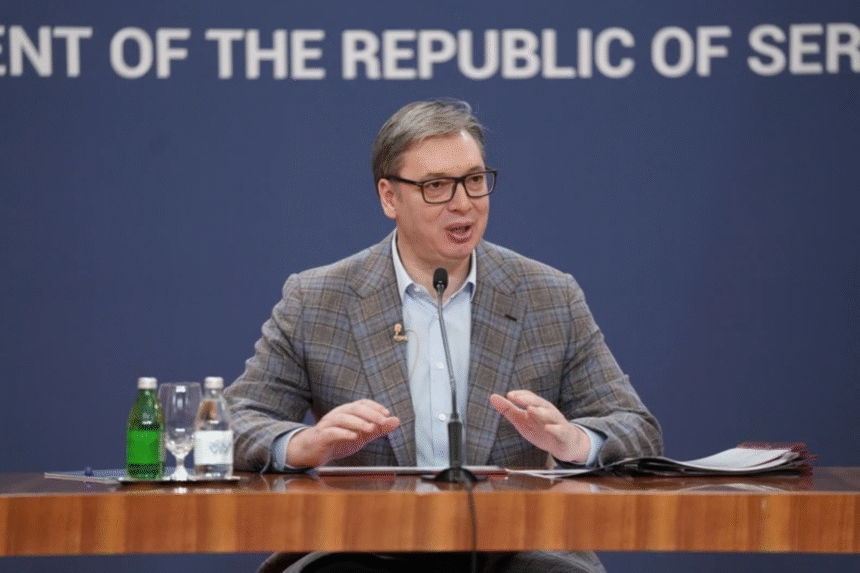Serbia is now facing serious problems due to its 2008 economic agreement with Russia, under which it sold its financially struggling state-owned oil company NIS (Naftna Industrija Srbije) to the Russian state oil giant Gazprom Neft.
At the time, Serbia hoped not only for economic benefits but also for political support—especially Moscow’s backing on the issue of Kosovo, Deutsche Welle reports.
Today, Gazprom Neft, together with Gazprom, holds about 56% of NIS shares, which has led the Serbian oil company to become part of the U.S. sanctions package against Russia’s energy sector earlier this year.
Croatian JANAF Suspends Shipments
The fact that Serbia’s most important oil company is affected represents a kind of “geopolitical misfortune”, said Serbia’s Minister of Energy, Dubravka Đedović Handanović.
“The sanctions were not imposed because of Serbia, nor because of the Serbian government. In his final days in office, U.S. President Joe Biden imposed them against Russia and its energy sector. For us, NIS is an extremely important and existential energy supplier. As a country, we are affected by the fact that two major powers are fighting their own battles,” Handanović said.
After that, Donald Trump took office as U.S. President, and exemptions were introduced so that Serbia’s energy supply would not be threatened. However, as of October 9, those exemptions have expired. NIS is now fully under sanctions, and the consequences are already being felt.
Since Serbia produces less than a quarter of its crude oil needs, NIS imports most of it from Kazakhstan, Azerbaijan, and Nigeria. The crude oil is shipped to Croatia, where it enters the JANAF pipeline that carries it to Serbia. But following the implementation of U.S. sanctions, Croatia’s JANAF company has halted deliveries to NIS.
Criticism Toward the Serbian Government
The opposition has been quick to blame the Serbian government.
Dušan Nikezić, an economic expert from the opposition Social Democratic Party (SSP), said that President Aleksandar Vučić has done nothing to reduce the country’s dependence on Russia, even though it has long been clear that the U.S. would eventually enforce tougher sanctions.
“I’m surprised by the government’s irresponsible approach to this problem. Now the Minister of Energy tells us that they were simply waiting to see if NIS management had a plan,” said Nikezić.
Vučić reportedly had several opportunities to discuss the matter with Russian President Vladimir Putin, but the result, according to Nikezić, was that “Putin threatened to cut off Serbia’s gas as well.”
In May, Serbia’s ten-year gas contract with Gazprom expired and was extended only until the end of this year.
This has fueled speculation that Russia is pressuring Serbia to ensure NIS remains under Russian ownership.
The Russian ambassador to Serbia, Aleksandr Bocan-Kharchenko, rejected such claims, stating:
“We will not cut off gas supplies to Serbia. We will continue, with the best possible prices.”
What’s Next for NIS?
Recently, President Vučić met with Gazprom Neft Chairman Alexander Dyukov and Russian Deputy Energy Minister Pavel Sorokin to discuss the future of NIS.
The exact solution has not been revealed, but Vučić assured citizens that there will be no energy crisis.
“These are difficult times. But I can guarantee the citizens of Serbia: there will be no shortage of oil or oil derivatives, nor will there be an energy crisis in Serbia. Our Russian friends understood our message, and we understood their interests. We will do what is best, both tactically and strategically, for Serbia,” said Vučić.
Serbian media, citing government sources, report that the Serbian state is considering buying part of NIS’s shares to reduce Russian ownership. If Russia’s international position “normalizes” in the future, the purchased shares could allegedly be resold to Moscow — that’s the supposed plan.
Is an Energy Crisis Coming?
For now, Serbia is not facing an energy shortage. But some citizens are already anxious, recalling the fuel scarcity of the 1990s wars, when gasoline was sold in bottles and canisters.
Ordinary Serbs are also beginning to feel the impact of the sanctions: NIS and Gazprom gas stations are now excluded from Visa, Mastercard, and American Express payment systems.







